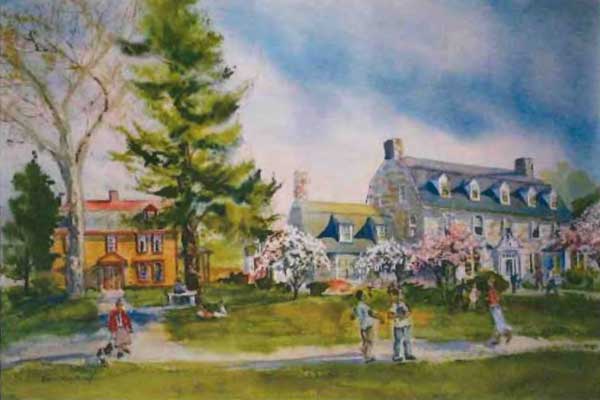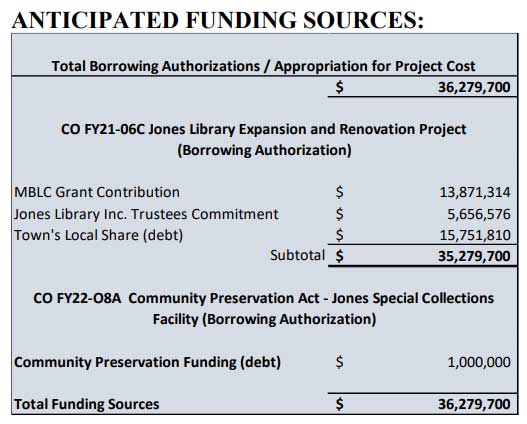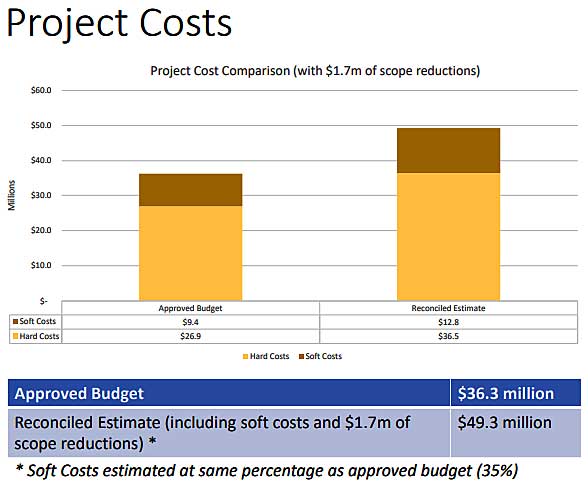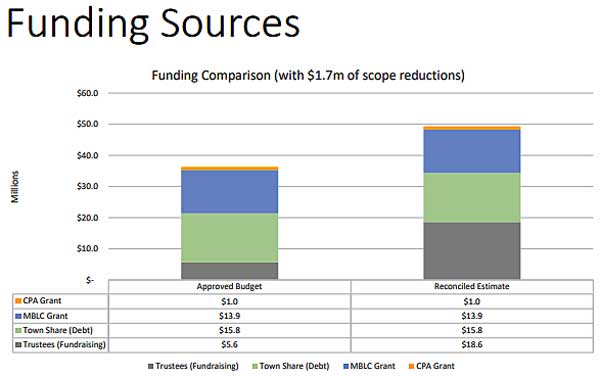Finance Committee Confronts Library Project Budget Overruns. Libraries Lobby State To Cover Cost Escalation

Photo: joneslibrary.org
Jones Library News Highlights For The Week Of September 6, 2022
Finance Committee To Seek Answers From Trustees
The Amherst Finance Committee met on September 7 and began reviewing the financial viability of the Jones Library renovation-expansion project based on recently updated budget projections.
Finance Committee Chair Andy Steinberg described the meeting as an informational session with no decisions to be made. He briefed the committee on the Town Council’s April 2021 decision to authorize $36,279,700 for the project, in a vote taken before FinCom members and Councilors Michele Miller and Elisha Walker had been elected. Steinberg pointed out that the town’s local share of project costs was pegged at $15,751,810 and he explained that Library estimates for performing similar repairs without a building addition ranged from $12 – $16 million. This comparison motivated the Council’s 10-2-1 approval of the appropriation, he said.

Vice Chair Cathy Schoen pointed out that the repair estimates made no accounting for a possible Community Preservation Act award of $1 million. The repair estimates also assumed no grant funding, Library Capital Campaign donations or Trustee commitment.
Finance Director Sean Mangano presented an updated summary of the project’s finances, stating that the approved budget of $36.3 million has been eclipsed by rising construction costs and now stands at $49.3 million.

He concluded that meeting this $13 million deficit would require the Jones Library Trustees to increase their fundraising goal from $5.6 million to $18.6 million.

Town Manager Paul Bockelman explained that a Memorandum of Understanding between the town and the Library Trustees which was approved by the Town Council in 2021 limits the Town’s commitment to $15.8 million and backstops the Trustee fundraising commitment of $5.7 million with the value of the Library endowment. He summed up the new discussion that needs to take place as “Does the entire amount of the increased expected costs come from the trustees and fundraising [or does] the council want to put more money into the project?”
“It could be a number of different variables that we can try to outline in the future for you in terms of how we meet this new challenge of the $49 million budget,” he said.
FinCom member Miller asked who is responsible for the approximately $1.4 million in designer and project manager fees that would be incurred if the project is allowed to proceed to the bid phase.
“That would be the town being responsible for that if we choose to move forward, but our habit is that we make sure that we have a strong funding plan before we take the next significant step, and that’s why we’re having this conversation,” replied Bockelman.
Town Council President Lynn Griesemer presented a list of questions for the library trustees aimed at collecting information needed to continue the review of the building project finances. Areas of interest consisted of the status of the library endowment, latest construction cost estimates, the fundraising plan, potential historic tax credits, and clarification of repair options.
Additional questions were accepted from attendees during the public comment period. FinCom member Walker asked if there has been an analysis of the impact of the budget gap on the Town’s capital plan and capital and operating budgets. Griesemer added it to the list, observing that this was a question for Town Administration and not the Trustees.
Miller described a lack of clarity in the decision-making process and asked who would be responsible for urgent library repair costs if the project does not move forward. She also suggested that more complete communication of the process to the public is needed.
The discussion of the Library Project budget and funding will continue at both the Sept. 12 Town Council meeting and the Sept. 13 Finance Committee meeting.
Building Committee Eliminates Sawtooth Roofs And Real Slate To Further Reduce Renovation Costs
At the September 8 meeting of the Jones Library Building Committee (JLBC), members reviewed a list of cost-cutting changes to the building project design that had been recommended by the Design Subcommittee. These “value management” changes included measures such as concrete sidewalks instead of stone and granite pavers for a savings of $575,000 and using acoustic ceiling tiles in lieu of compound wood ceiling for a savings of $300,000.
Trustee Alex Lefebvre proposed two new cost reductions that had previously been considered not plausible. Using synthetic slate on the renovated building’s roof had been ruled out because it would not meet historic preservation requirements, but Lefebvre reported that the Amherst Historical Commission had allowed synthetic slate on the roof of the historic Boltwood Inn, and she suggested that it be used on the Jones Library as well. Owners Project Manager (OPM) Craig DiCarlo said that if synthetic slate were as inexpensive as metal, a savings of $320,000 might be realized.
Lefebvre also spoke with the Library’s Sustainability Committee and learned that seven sawtooth roof skylights, proposed by the designer to allow the mounting of solar panels and to let in natural light, were not essential from a sustainability standpoint. Replacing the sawtooth structures with flat roof would save an estimated $495,000. Library Director Sharon Sharry commented, “the architects will be a little disappointed because of the aesthetic difference, but it’s five hundred thousand dollars so I think it’s something we should do.”
The JLBC approved the two new changes and eight others that had been recommended by the Design Subcommittee. The total cost savings was estimated to be $1.915 million, reducing the project budget gap to $9.6374 million.
Finance Director Mangano reported that an amended contract with the designer Finegold Alexander Architects (FAA) had been signed. He received approval to pay FAA invoices for the months of May and June – both for $163,500.
Zander Lopez asked if there is a force majeure provision in effect that would free the Town from owing designer fees if the project is canceled. Mangano replied that the Town would owe FAA for all services rendered, but would not be committed to pay the designer after project termination.
Mangano broke the news that the MBLC has sent a letter announcing that they would be delaying the next $2.7 million grant disbursement until the end of the project’s bid phase, moving the disbursement delivery date from June 2023 to at least December 2023. He explained that the MBLC is concerned about project delays and uncertainty around the ability to fund it.
The OPM presented an updated schedule showing the project closeout occurring in mid-2026.
In Topics not Anticipated by Chair 48 Hours in Advance Director Sharry described a meeting she had attended with Town Council President Griesemer, State Representative Mindy Domb and State Senator Jo Comerford. The group discussed joining forces with 13 other Massachusetts libraries that have experienced escalation problems similar to the Jones. The libraries with building project budget challenges plan to team up with municipal leaders and state legislators to urge the state to cover escalation costs out of state budget surplus and ARPA funds. Details of this initiative will be presented to the Board of Library Trustees and the Town Council as they emerge.
The next JLBC meeting is scheduled for Thursday, September 22 at 4pm.

Looked at dispassionately, this is a $50 million project that does provide needed renovation, but that also results in a net gain of only about 15,000 square feet, and that requires the demolition and replacement of a perfectly serviceable, 25-year-old, ADA-compliant $20 million addition. Rather than a renovation and expansion, why not simply build an entire new library? Surely that sum could allow the Jones to design and build the library of its dreams, with plenty of open space AND adequate parking at a location that doesn’t require it to subject the current building and lot to changes that many feel will result in the complete loss of character of an important town institution.
Just to build on Denise’s idea, could it make sense to build that new library on the current site of Wildwood School? It would no longer be downtown, but it would be on the campus of the middle and high schools, and people can walk or bike from downtown through the school grounds. Then the library can be repurposed for some other noble use. Though there would be some sentiment about that not being the library, there’s not enough sentiment to prevent the demolition of major parts of it. So in the spirit of “no stupid ideas” I think this is worth considering, if it ever happens that there would be a diverse and inclusive and innovative and open minded reinvention of the entire library project.
I love libraries, and have been generally not sticking my big nose into the library issue. But it does seem to be at a very critical juncture, and the solution is surely not to be found by just pushing forward. It’s time for an uncommon amount of fair process and collaboration in Amherst.
Excellent reasoning!
My idea, which I first wrote about two years ago, is similar to Ira’s although I want to keep and renovate the downtown Jones library but to move the circulating libraries and children’s rooms to the Wildwood campus, which they would share with the Senior Center, and a Youth Center with plenty of room for all, on one floor with lots of free parking that does not require crossing a busy street. The downtown campus would be repurposed as a research and reference center, closely joined to the Amherst Historical Society’s Strong House (but not trammeling its beautiful lawn). It would also continue to serve as a community space for downtown residents who may be less interested in the library’s collections but are grateful for a welcoming downtown communal space.
There can be many variations on this idea, but adding a fourth campus to the Jones r System would be a welcome move and is not a particularly shocking one. There would be many competing demands on a newly available Wildwood building, but I would give high priority to the senior center, a youth center as has been discussed recently, and a spacious library requiring neither elevators nor stairs. Preserving and improving the Jones Library building downtown would no longer be contentious. Funding the renovations of both the Jones and the Wildwood buildings would require a different kind of collaboration between the library and the town, but that would be welcome too.
Capital ideas — in more ways than one! Likely the Trustees will argue against them, stating that the grant cannot be used for anything other than the approved program, and that the money is already in hand and should be used. While the former is true, the latter is debatable. The project was approved for $36 million dollars. It has now risen, using the most hopeful projections, by $13 million. That is more than 30% of the original cost, and is likely overly optimistic, and the sources of this additional cost are in no way guaranteed, nor is additional state funding. This figure also does not take into account the interest that must be paid on the increased amount. No one has said, “Leave the Jones Library as is. Do nothing.” It is possible to support and to fund renovations, additions, and enhancements to the library and its offerings that allow both taxpayers and the Town to stay within budget constaints that we all increasingly feel. If the Trustees continue to push this project, in the face of rapidly increasing costs and overly optimistic budget projections, and if they continue to maintain that its impact on other vital Town needs is not their concern, they will continue to widen the many divides that already afflict Amherst. It is understandably difficult to have to abandon a project that has involved so many years of extensive effort and planning. But reality sometimes dictates that no matter the investment of time and effort, some projects should not continue to move forward. The Trustees’ best course of action is to stop, examine carefully the fiscal reality before them, and to recognize that this is not their only alternative. They will not lose face. Instead, by doing so, they will begin to bridge divides, and to find that the residents of Amherst are eager to collaborate to find creative solutions that will generate enthusiastic and widespread public support.
The ideas just proposed by Michael and Ira — particularly the repurposing of the present Jones building as a research library in light of the vast historical archives housed there, and next door at the Strong House — are simply brilliant!
The budget fiasco which the currently conceived demolition/expansion will precipitate upon the Town, together with the loss of historically significant architectural features inside and outside the building, demand a revolutionary
change in thinking about the future of library services and facilities.
Will the Library Trustees please, please, please give these ideas serious consideration?
In line with re-thinking where to site town services, I’d like to suggest consideration of the aptness of locating ESL services near youth and senior gathering spaces, or, tentatively, in school buildings after school hours and weekends. The first idea places new English learners in proximity to those who might be interested in people from varied places around the globe, and the second idea uses vacant school space productively for learners.
Either place might encourage the introduction of newcomers to the community, and the equally important vice versa.
Like Ira, I love libraries. I will never forget my first tour of a library as a college student. I was in awe of these resources, all free, and with helpers to answer questions! In Amherst, I’ve heard the controversy and the contradicting data, but in the end, I have to go with Bob Pam’s analysis. Ultimately it’s not about the value of a library but whether we can afford it. As the trustee charged with it’s finances, Bob Pam has the closest eye on the numbers and the risks. He says it’s too risky.
Now there are ideas about library resources and youth gathering places being in close proximity to our schools. What could be better? And, having seniors and youth near each other is much needed. It sounds like we have a way forward that works financially and is better for the youth we’re trying to serve. These are ideas I can support.
I find it interesting that some town councilors extoll the virtue/wisdom of “the professionals” when it is in line with their views, but do not when (e.g., Bob Pam’s assessment) it is not.